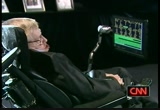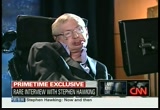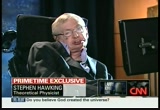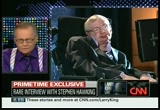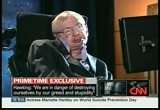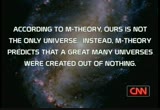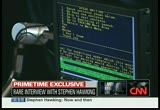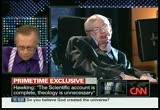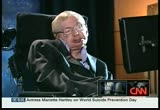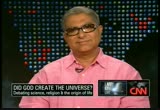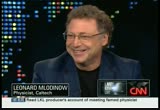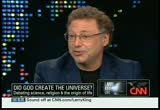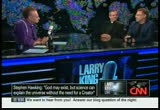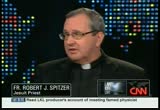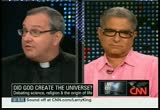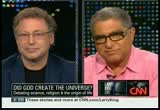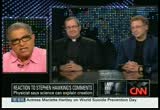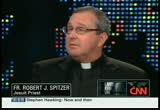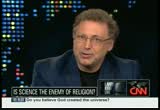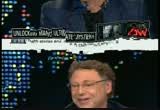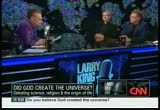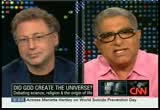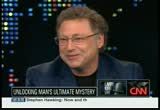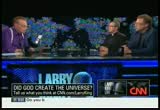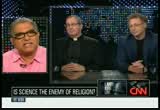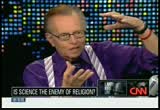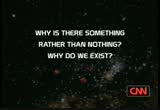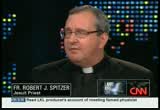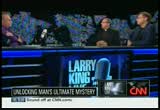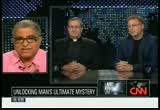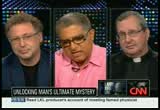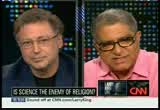tv Larry King Live CNN September 11, 2010 12:00am-1:00am EDT
12:00 am
i don't feel i need to watch the show. the show itself makes me very stressed out much it's not a relaxing experience. it bothers me. i'll just watch this on a loop all weekend long. >> that's what we're doing right now. you just love it. >> yeah. brianna, have a great weekend. that's it for "360." larry king starts right now. thank you for watching. have a great weekend. >> larry: tonight legendary physicist stephen hawking will answer this question, did god create the universe? >> god may exist, but science can explain the universe witut a need for a creator. >> larry: his new book made start lg and controversial new claims about the origin of everything. has he unlocked man kind's ultimate mystery? >> the scientific is complete.
12:01 am
theology is unnecessary. >> larry: stephen hawking on why we exist next on "larry king live." good evening. very special program tonight. stephen hawking is a theoretical physicist. he was the professor of mathematics at the universe of cambridge for 30 years. he's the 2009 recipient of the presidential medal of freedom and co-author of a brilliant and controversial new book "the grand design." we welcome him back to "larry king live." we have a serious of questions planned. let's get right to it. stephen, why is it important to find the grand design of our universe? >> i believe everyone should have a broad picture of how the universe operates and our place
12:02 am
in it. it is a basic human desire and it also puts our worries in perspective. >> larry: you say science can explain the universe without the need for a creator. what is that explanation? why is there something instead of nothing? >> gravity and quantum theory cause universes to be created spontaneously out of nothing. >> larry: you write that because in is a law such as gravity, the universe can and will create itself from nothing. will you tell me how that law came into existence? >> gravity is a consequence of "m" theory which is the only possible unified theory. it's like saying why is two plus two four?
12:03 am
>> larry: i guess simply put, do you believe in god? >> god may exist, but science can explain the universe without the need for a creator. >> larry: so he may. i'll pick up on that with the panel. your book has stirred a lot of controversy. why do you think people react so strongly to your contention that it's not necessary to invoke god to explain the creation of the universe? universe?>> science is increasingly answering questions that used to be the province of religion. >> larry: one of your colleagues out of cambridge says that science provides us with a narrative as to how existence may happen, but theology addresses the meaning of the narrative. how do you respond to that?
12:04 am
>> the scientific is complete. theology is unnecessary. >> larry: pretty directly put. what gives your life, your existence, meaning? >> i have a full and satisfying life. my work and my family are very important to me. >> larry: you recently said that you see great dangers for the human race. what are the sources of these dangers? is it mankind, itself, or external factors? >> we are in danger of destroying ourselves by our greed and stupidity. we cannot remain looking inwards at ourselves on a small and increasingly overdroughted
12:05 am
parent. >> larry: what are mankind's chances of surviving these dangers? >> if we can get through the next few hundred years we should have spread out into space. then an isolated disaster will not wipe out the entire human race. >> larry: we have to get through the next 200 years though. we'll be right back with more of the directly responsive stephen hawking. we'll meet an outstanding panel following him. the book is widely discussed and being reviewed everywhere. the book is "the grand design." [ talking ]
12:06 am
12:07 am
♪ [ male announcer ] ever have morning pain slow you down? introducing bayer am, an extra strength pain reliever with alertness aid to fight fatigue. so get up and get goin'! with new bayer am. the morning pain reliever. [ tires screech ] [ engine revving ] [ drums playing ] [ male announcer ] 306 horsepower. race-inspired paddle shifters. and f-sport-tuned suspension. all available on the new 2011 lexus is. it isn't real performance unless it's wielded with precision. [ male announcer ] nature is unique...
12:08 am
...authentic... ...pure... and also delicious. ♪ like nature valley. granola bars made with crunchy oats and pure honey. because natural is not only good, it also tastes good. nature valley -- 100% natural. 100% delicious. according to "m" theory ours is not the only universe. instead, "m" theory predicts that a great many universes were created out of nothing.
12:09 am
their creation does not require the intervention of some supernatural being or god. rather, these multiple universes arise naturally from physical law. they are a prediction of science. >> larry: we're back with stephen hawking, he's in cambridge, england. he's the co-author, and we're going to meet the co-author in a little while of "the grand design." you have written, stephen, that time travel was once considered scientific hairsy. how likely is it that time travel will one day become a reality? >> time travel used to be thought of as science fiction, but einstein's theory of general relativity allows the possibility that we could warp spice time so much that you could fly off in a rocket and return before you set out.
12:10 am
i was one of the first to write about the conditions under which this would be possible. unfortunately, it is likely that the warping would destroy the space ship and maybe the space time, itself. >> larry: if you could time travel, would you go forward or backward? >> i would go forward and find if "m" theory is indeed the theory of everything. >> larry: do you have a hero? who is your hero? and if so, why? >> galaleo, the first modern scientist who realized the importance of observation. i feel closest to him because he followed his nose and was a bit of a rebel. >> larry: you have said that experiencing zero gravity is one
12:11 am
of the most meaningful experiences you've ever had. why? >> zero gravity was amazing. i could have gone on and on. being confined to a wheelchair doesn't bother me as my mind is free to roam the universe, but it felt wonderful to be weightless. >> larry: what, stephen, to you most hope people take away from your new book "the grand design? ?" in your opinion, it's a great book with a lot of important points. what is the most important point in the book? >> that science can explain the universe and we don't need god to explain why there is something rather than nothing and why the laws of nature are what they are. >> larry: what quality or lesson would you most like to pass on to your children?
12:12 am
>> look up at the stars, not down at your feet. >> larry: sack sinkt. you are 68 years olds. you'll be 69 in january. you have many admirerers, always worry about and wonder about your health. can you tell us how you're doing? >> when i was first diagnosed with als i was given two years to live. now 45 years later i am doing pretty well. >> larry: stephen hawking, who we trust will be with us for many, many years to come with many more books to come, with many more thoughts to come. we thank him very much. stephen hawking, theoretical physicist, lucasian professor of math at the university of cambridge for 30 years.
12:13 am
the 2009 recipient of the presidential medal of freedom and co-author of the new book "the grand design." what do scientists and people of faith think about hawkings' theories? we'll find out an that and meet the co-author of the book next. the most powerful half-ton crew in america has a powertrain backed for 100,000 miles. chevy silverado half-ton a consumers digest best buy and the most dependable, longest-lasting full-size pickups on the road. now get 0% apr for 72 months on 2010 silverado half-ton models with an average finance savings around $5,600. [ female announcer ] scope outlast. it's about time for a mouthwash that lasts even longer. now that fresh breath feeling lasts up to 5 times longer. what will you outlast?
12:14 am
this will save you the most money, while making sure you have the auto coverage you need. this is good stuff. no problem, i'm a coverage counselor. it's what i do. thank you for being an esurance customer. great. bye, richard. so, did you guys get enough to make an online version of a coverage counselor? yep. let's code it and load it. [ imitates explosion ] oh. you're so popular. like prom queen. [ telephone rings ] [ male announcer ] want a great deal on car insurance? go to esurance.
12:16 am
only a very few would allow creatures like us to exist. thus our presence selects out from this vast array only these universes that are compatible without existence. although we are puny and insignificant on the scale of the cosmos, this makes us in a sense the lords of creation. >> larry: welcome back. leonard maladno is a physicist at cal tech. he's bestselling author and co-author of "the grand design." deepak chopra is a spiritual teacher. his latest book will be a runaway bestseller, "mohammed the story of the last prophet"
12:17 am
comes out this month. father robert j. spitzer, president of the center of faith and reason and spitzer center for ethical leadership. he's the author of "new proofs for the existence of god: contributions of contemporary physics and philosophy." the catholic church. i once had a catholic priest tell me once that he was a jesuit, he spent that day with catholics and remembered what a catholic was. anyway, we'll start with leonard. how did you come to be co-author? how did this come together, you and stephen writing the book? >> it started around 2002. i had written my first book which was about the concept of curve space and how it came about and how we use it in physics. one day my agent called me and said, hey, guess what, how would you like to write a book with stephen hawking?
12:18 am
i thought about it for, maybe a millisecond. i said, that sounds good. that wasn't this book. that was "a briefer history of time." he had an idea to write a book that was clearer, more understandable than his book "a brief history of time" which he recognized a lot of people tried to understand but had trouble with. he had been looking for a co-author because he wanted some help rewriting that book and hadn't been able to find anybody he wanted to work with. he liked the way i wrote, and he liked the fact i'm a physicist. i heard the story at first, many years later, and so he said, i'll write it if i can get maladno. i said, yeah, yeah. it was a fun book. when i finished i thought, we should write a book about his current thinking. his thinking advance a lot. that time around 2005 he was coming up with new, interesting ideas. and physics and cosmology advanced a lot. he visits cal tech every year for six weeks.
12:19 am
i said, stephen, how would you like to write another book about your latest thinking? he said, sure, and that's all the discussion there was. >> larry: how much of the book is him, how much you? >> well, it's hard to say. the book is a book, of course, on his ideas and latest thinking. we passed it back and forth so much. i couldn't go back and point out -- >> larry: do you agree with it? >> yes, i do. >> larry: not just a reporter -- >> i look at it this way. i was a graduate student. it was like being a graduate student again which is the fun of it. i sat at his side. he taught me his latest thinking. we argued, discussed, debated the implications then debated the book back and forth. >> larry: he can -- i interviewed him before. he said at times he's been more elaborate. why do you think he was more direct tonight? he was concise. >> he was very concise, and i'm not sure, maybe he's been interviewed so much that he just wants to cut to the chase. >> larry: he cut to the chase all right. >> you know, over in england this is such a big thing i think
12:20 am
they need to build an electrified against around his office. >> larry: the sense of everything he said was concise enough to tell us what he was thinking, right? he brought the point home. >> i think he did. yeah. >> larry: one of the essence is god didn't teach us this. what is, to you, i asked him the essence of the book. what is it to you? >> the book is about two questions, fundamentally. one is where did the universe come from? the other one is why are the laws of nature what they are today? it does turn out the laws of nature are very finally tuned to -- so as to allow for the existence of intelligent beings. i don't mean to say somebody tuned them but they happen to be that way. >> larry: that allowed us to be that way without having someone creating it? >> let's not prejudge that question. when you look at the laws of nature you can't change them without destroying the possibility of complex life. the book is about the answers to those two questions and we conclude in the book, not what we decide to write the book about, but one of the conclusions in the book,
12:21 am
something based on the research we talked about in the book -- for either of those god was not necessary to create the universe or make the laws what they are. >> larry: before we bring in deepak chopra's thoughts, does this constitute for us to think, therefore, you and he are atheists? >> i think that what we think personally, our personal beliefs aren't relevant. unlike religion or other fields, science is not based on authority. it's not the authority that stephen hawking or leonard maladno says this or that. we like to present ideas and ideas of modern science and our own personal beliefs really don't answer into it. may i also say we don't tell other people what to believe. >> larry: granted. the jez wits are the thinking arm of the catholic church, father. what do you think? >> well, some aspects of his previous book, "brief history of time," i liked a little better because there was an openness to transcendence.
12:22 am
he asked a question at one point, what breathed fire into the equations of physics so that they would have a universe to describe? and i thought that openness reflected in the question -- >> larry: could have been god? >> it could have been god, it could have been something else. he was open to the very possibility. i think by foreclosing the possibility of god, in other words, answering that question with the universe, alone, the new book gets into a little bit of a problem. in fact, a big problem. it doesn't quite answer the something from nothing problem that really arises. because if the universe or the equations of physics or "m" theory is going to breathe fire or existence into itself, then it literally is going to have to bring itself out of nothingness. in other words, if the equations of physics produced the universe that is going to bring itself into reality, you're going to
12:23 am
have to explain, how could something come from nothing? how could the equations of physics produce this? >> larry: simply by saying there was a creator? >> i would simply say you should remain open to the creator, otherwise if you don't you're really going to have to say that something came from absolute nothingness and that is a real difficult thing. >> larry: well put, well stated. we'll get deepak's thoughts and the panel will be with us the rest of the way. science the enemy of religion? is religion a threat to science? we'll answer these questions ahead. [ male announcer ] your first day. you try to lie low, get the lay of the land. but then autoblog.com calls your interior lexus quiet. and automobile magazine goes comparing you to a cadillac. ♪ so much for the new kid fitting in with the rest of the class. the all new chevrolet cruze. starting under $17,000. get used to more.
12:24 am
♪ ♪ check the wife check the kids check your email messages ♪ check the news online ♪ check the money in the bank check the gas in the tank ♪ ♪ check the hottie walking by... ♪ ♪ ...wait that's a dude, no thanks ♪ ♪ check the new hairdo check the mic one two ♪ ♪ 'cause i'm about to drop some knowledge right on top of you ♪ ♪ you check a lot of things already why not add one more ♪ ♪ that can help your situation for sure ♪ ♪ check your credit score ♪ free-credit-score-dot-com free-credit-score ♪ ♪ you won't regret it at all vo: offer applies with enrollment in triple advantage.
12:25 am
12:26 am
[ male announcer ] progresso. you gotta taste this soup. >> larry: leonard mlodinow, physicist and key author of "grand design." father spitzer remains with us. we're joined by deepak chopra, spiritual teach e and bestselling author. book "muhammed." i think it will be a bestseller. deepak, give us your overview of what we've heard from mlodinow and stephen hawking.
12:27 am
>> mlodinow, who i think in my mind is my lord now, was gracious enough to send me the book before it was published before it came out. i read it three times. i found it validating everything i knew from my own experience of wisdom traditions and perennial philosophies. 700 years ago the great sophie said we come spinning out of nothingness scattering stars like dust. he said, look at these words, spinning out of nothingness. this is within your power. a great from 2,000 years ago said, infinite words come and go in the vast expanse of nothingness which is consciousness and they're like dust dancing in the beam of light. so i tell you, it validated everything. the only difference between me
12:28 am
and my lord now is that i believe this nothingness, this nothingness is not an empty void. it's the room of creation. that nation goes to exactly the same place to create a galaxy of stars, a rain forest, or a thought. this is the formless mind of the infinite being. it's the transcendent mind. leonard will say the same thing, but he won't use the word transcendence. he'll say it's a field of possibilities or a super position of possibilities. in fact, he says in the book that at least 500 universes could possibly exist in super position of possibility at this level. which to me suggests an omniscient being. the only position i have is god
12:29 am
did not create the universe, god became the universe. okay. >> larry: deepak, what do you think of stephen hawking? >> i think he's the most important figure in our time. he has iconic stature, similar to einstein in our time. he -- his mind roams the edges of the universe. he's most significant scientist. he has the greatest amount of perceived authority in the world right now. >> larry: father spitzer, what do you think of stephen hawking? >> i think he is obviously a very intelligent physicist. i think at the same time, though, certainly capable of oversights, as we all are, particularly the oversight about nothingness, giving rise to something in the absolute sense, with all due respect to deepak. i think also maybe even some
12:30 am
logical errors that might be made especially in logical determinism. >> larry: leonard, are you going to do a book with deepak? >> we're talking about that. yeah. >> larry: and the theme would be what? >> well, it would probably be something related to what we're talking about today. his point of view, i have my point of view. we thought discussion of that could be of interest to people. >> larry: let's assume, it's a fair assumption, the three of you are being interviewed by an idiot. >> can we assume there are three idiots sitting around the table trying to understand the universe? >> larry: i don't know. effective means of asking questions. i don't know. the first simple question, let's start with you, leonard. who created the nothing? how can something come out of nothing? where did the nothing come from? does there have to be a something -- a beginning?
12:31 am
>> so around the turn of the 20th century, physicists started to discover that the actual nature of the universe isn't quite what people thought it was. before then people pretty much looked around them and had theories, newton's law, maxwell's equation, what we see with our senses and the way we think with our minds. physicists started to look deeper. a lot of counterintuitive and hard to understand concepts came up which can be understood and described with mathematics. one of them is this con concept of nothingness. you can have nothingness, but from that things will arise, pop into existence and out of existence again. that's hard to understand and hard to accept. that particular phenomenon has been tested and confirmed many times in the laboratory. >> larry: so there can be a nothing? >> so there's nothing but nothing is not stable. things come and go from nothingness. thing?
12:32 am
>> yeah. well, the question of time is also one that you have to be careful about, because one of the intuitive ideas that we have is a newtonian theory of time and space. it's a framework. time moves forward in the linear fashion and what we do doesn't effect time and space. einstein found under certain extreme conditions you have to take into account how the actors on the stage interact. time and space aefect each other. as you go back in time, when the universe is very, very small, time ceases to have the meaning we think of it as having today. you can't really go back, you can't follow time backwards like it's a railroad track to get to the station and it's the beginning. that question of what's times zero is a difficult question to phrase. >> larry: we'll come back with more, more of your blog comments, too. ♪
12:33 am
[ male announcer ] it's luxury with fire in its veins. bold. daring. capable of moving your soul. ♪ and that's even before you drop your foot on the pedal. ♪ the new 2011 cts coupe from cadillac. the new standard of the world. and then there's most complete, like what you get from centrum ultra women's, the most complete multivitamin for women. it has vitamin d, which emerging science suggests supports breast health, and calcium for bone health. centrum ultra women's.
12:34 am
concierge claim centers. so i can just drop off my car and you'll take care of everything? yep, even the rental. what if i'm stuck at the office? if you can't come to us, we'll come to you in one of our immediate response vehicles! what if mother won't let me drive? then you probably wouldn't have had an accident in the first place. and we're walkin'! and we're walkin'... making it all a bit easier -- now that's progressive! call or click today.
12:36 am
it is reasonable to ask who or what created the universe, but if the answer is god then the question has merely been deflected to that of who created god. in this view it is accepted that some entity exists that needs not a creator and that entity is called god. this is known as the first-cause argument for the existence of god. we claim, however, that it is possible to answer these questions purely within the realm of science, and without invoking any divine beings. >> larry: by the way, deepak chopra has written a blog exclusive to us, called "taking a stand muhammed in the age of jihad. two to cnn.com/larry king to read it. we have a blog question. do you believe god created the universe?
12:37 am
we posted it on larry king live blog at cnn.com/belief. here's some of the excerpts and your comments. even if there is no need for a god to create the universe, that does not mean god did not create it. right, father? >> i would conquer with that. yes, because the need for it is our possibility in recognizing the need. >> larry: another one says, deepak, i go for what einstein said in believing in a god in the orderly harmony of what exists, not a god that concerns himself with the fates and actions of human beings. do you agree with that? >> i do. that's exactly what was said in a different kind of language. when you ask about what was there before the beginning, that's a very relevant question. you know, when leonard answered it, i would like to also address it because you say, what created god? or what created the nothingness?
12:38 am
if nothing is outside of space time, it is actually not in space time. space time are an activity of that nothingness. behavior of that nothingness. as are all laws of nature, but the laws of nature are not inscribed somewhere in a book. they exist in the consciousness of mathematicians. no equation will ever make the universe work. the equations merely describe the behavior of the universe. so you know, when i think of mathematics i think of it actually as the language of god, and when i think of physicists, like leonard and stephen hawking, i think that's god explaining god to god using mathematics basically. and you know, stephen really acknowledged -- i think leonard will acknowledge, too, that there's a theory in mathematics called gordon's theorem which
12:39 am
actually states very explicitly that no mathematical model will ever offer a complete explanation of what's going on, because gordon's theorem invokes almost a break from mathematical logic. leonard, would you say that? >> actually i would agree with almost everything you just said. >> okay. >> on the -- i would. with maybe some fine tuning of nature. but the one thing that i would have to think about is what you say about gordon's theorem. that applies to asimatic system. >> larry: meaning? >> meaning you state a few mathematical principles and derive everything using mathematics from those principles. that's not what science is. science is based on ideas that come from observation. >> larry: do you believe something happens to us when we die? >> i don't think what i -- you know, i don't think that what i
12:40 am
personally believe matters very much. >> larry: is there a physics explanation for what happened? >> there's no physics explanation. in fact, there's no physics explanation for consciousness and as far as i can tell i've never seen consciousness defined in a way -- >> larry: hold it, deepak. can physics explain birth? >> i think physics can explain material birth. if there's some other dimension to human beings, say a spirit or soul that is not reducible to material existence or physics, then no, physics would not be able to explain the human being completely at birth. >> larry: another blog. god is a personal matter and is interpreted many ways. science must be proven or disproven, has no import to beliefs. no, the universe was not created by a god. that is the -- one of the blog responses. another is, stephen hawking is
12:41 am
gd's gift to all of us. thank the creator he provides us with such men because they're a blessing in disguise challenging all of us to question the integrity of belief systems. do you agree with that, deepak? >> i do. belief is a cover-up for insecurity. you only believe in things that you're not sure about. if i asked you the question, do you believe in electricity, you'd say that's a ridiculous question, or gravity. i think your experience of god, knowledge of god is more important than belief in god or faith. faith is the ability to step into the unknown. that is what real faith is. to be open ended. and you know, things like physics and mathematics cannot even explain how biological organisms function as an integrated whole. how does a human body think thoughts, play a panel, and make a baby all at the same time?
12:42 am
no physical explanation yet. when i talk to leonard he says -- you know, leonard says one day we'll have an explanation. i say that's a promissory note. in the current economic situation i don't cake promissory notes. >> larry: faith doesn't require proof? >> sometimes when people set up some dichotomy, science versus physics i don't quite get it because the grand design is about what the modern theories of science say about the universe and if you want to believe something on faith you can. we don't -- we don't claim to prove in the book there is no god or tell you not to believe in god. we just talk about the answers of modern science to those two questions, how did the universe get here and why are the laws what they are? >> larry: how about those who say, an astronaut would say, look, is nothing -- the only thing is that blue planet. and how can you say nothing created that? that that came out of nothing?
12:43 am
those rivers? >> there are a lot of awesome things in the world that we wonder about that are almost beyond human power to understand in their beauty or their significance. and that's the realm i think of philosophy and religion and a lot of people ponder that. novelists. in science what we look at is how the universe is. what can we say about the way the universe is? what we measure and what is the order that we observe? and so we -- there are two separate domains. >> larry: the book is "the grand design." when we come back, we'll have another question from the dumby. don't go away. everythinge do belin it's a yea 50 milpromise. wi complenta schemaintee and /7 roaide assiance. beusen y ce the st bif, faaronar
12:44 am
12:46 am
12:47 am
why do we exist? why this particular set of laws and not some other? this is the ultimate question of life. the universe. and everything. >> larry: the book "the grand design" stephen hawking was with us earlier. we're be leonard mlodino, the co-author of that book. deepak chopra, spiritual teacher and bestselling author. and father robert j. spitzer, the famed jesuit priest. what if i were to just say, father, what's it -- so what? why do i have to wonder about these things? it is or it isn't. i'm here. i will be here. i will do my best. i will die. something might happen to me. something might not happen to me. why is all this important? >> because human beings by nature just want to make the most out of their lives. they want the most meaning that they can possibly have. they want to know who they really are at their deepest level.
12:48 am
whether empirically obvious or not. perhaps there is something more to human beings than merely physics or "m" theory. maybe we're capable of unconditional love. maybe we have a spiritual nature. we're constantly inquiring because we want the most out of our lives. we don't quash the mystery. we enter into the mystery. most of the time we turn to the mystery by asking questions. there was a great physicist, sir arthur eddington, wrote a book called "the nature of the physical world. "at the end of it he said there are areas of the human spirit untrammelled by the physics. things of art, things of beauty. at the end of the day the light beckons ahead and the spirit surging within our nature responds. what he meant by that is there's a lot more to us than merely physics. even "m" theory, that there's something transcendent. human beings desire -- at the core of their being.
12:49 am
>> larry: deepak, if people talk to a heavenly father and believe from that talk they get solace, so what? >> yes, nobody objects to that. on the other hand, as father spitzer said, human beings have a need for meaning. now, you know, leonard and stephen hawking in the book categorically state that this is a deterministic universe, that therefore, free will is an illusion. by saying that, they also imply that incite, inspiration, creativity, enthusiasm, self-reflection, all of these are not there. you know, and yet the -- >> deepak, i don't think we imply that they're not there. we -- we don't say that at all. >> you do say -- >> i feel inspiration, it doesn't have to be there as a result of god. >> no. there as a result of creativity, if you're totally determined then there's no place for
12:50 am
creativity. right? so, you know, you have to -- stating this is a completely deterministic universe and denying us of this, calling it an illusion. you're depriving the universe of meaning. >> we're depriving the universe of -- we're depriving people of having little things floating above them, determining what they're doing outside the laws of nature, but my feelings, my feelings and my desires are as real if it's governed by physics as if it's governed by some spooky other thing. >> actually it does matter whether -- >> larry: hold on.
12:51 am
logically fallacious, you basically say because you can stimulate the brain, therefore there's going to be human behaviors. but then the conclusion that follows -- >> that's not what we used for that purpose. >> the conclusion that follows is all human behaviors is somehow just a matter of determinant physical activities and that's arguing from a particular to a universal and it's not logically correct. >> what we've argued in the book is that physics has developed over hundreds of years now and has been confirmed by thousands of experiments and the determinism we talk about in the book is an observation. it's an observation we come up with these mathematical theories based on determinism and what the laws are. we test them. the fact that people are at home watching us are a consequence and indication that our approach is correct. we're not telling you that there's not a spiritual world that you can't think about things in other ways. but we're talking about there's never been in any science experiment or any theory of science any indication that everything in the universe does not follow physical laws.
12:52 am
there are amazing fine structure elements of the cosmic microwave background information, the afterglow of the big bang that we can look at in the 1,000 fluctuations of that. guess what we find that that far away, long-ago thing matches exactly what the theories said it would that we're creating now. so, there is something to what we're saying. if we had found that things generally don't behavior that exceptions occur, as a scientist, i would say you're right. i'm not necessarily saying you're wrong but there's never been any incling of evidence that you're right. >> larry: we'll take a quick break and come back with the remaining moments on this incredible subject.
12:55 am
12:56 am
the saying goes, god didn't create man. man created god. i find it easier to believe that we don't know the answer to that question and never will. point? >> well, i would -- >> larry: we struggle but we ain't ever going to know. >> i think there are ways of gaining access to reality, spiritual or transcendent reality. traditionally, there have been proofs from the existence of god from plato onward. >> larry: give me one proof south florida metaphysical proof, for example, that stems from being itself unconditioned or uncaused. there's another one that stems from the pure intelligible of being. there's several other kinds of proofs that almost deepak alludes to when he talks about consciousness.
12:57 am
>> larry: where did our brain come from? >> right. >> larry: where did it come from, deepak, our ability to think? >> the same pogness where everything comes from. we have to congratulate leonard and stephen for finally, finally contributing to the climatic overthrow of the superstition of materialism, because everything that we call matter dumps from this domain which is invisible, which is beyond space and time. all religious experience is based on three basic fundamental ideas. nun one, transcendence, an intelligence that is beyond space and time, which is acausal. number two, the interconnectedness of all existence and, number three, truth, goodness, harmony, beauty, platonic values, including mathematical truth embedded at the level of the fundamental level of the universe.
12:58 am
and nothing in the book, nothing in the book invalidates any of these three ideas, transcendence, interconnectedness and our desire and our ability to embrace joy, loving, kindness, peace of mind, equinimity, math mat iccal truth. where do these thing come from? they exist at the fundamental level of space time geometriry. just like super positions of possibility contain spin and charge and gravity and time as possibility, so, too, does mathematical truth and platonic values. that's what sir roger pendrose, an often-time colleague ofstein hawking said. by the way, quoted by father said once in his writing,
12:59 am
something unknown is doing. we don't know what. i think that's where the case really rests. >> larry: we could sum it up there. leonard, in a couple of moments, sum up the grand design. we should read it because? >> we should read it if you're interested in the answers of modern science to the questions of why we are here, why the universe is here, why the universe is the way it is and if you're curious about knowing where you came from and what your place is in the universe. >> larry: it answers some of the questions to the one maybe unanswerable question. and that question is why? >> i think it answers why. >> larry: it answers why? >> the answer to why, one can always say why. and people are saying that. >> larry: or people might say why not? thank you all very much.
206 Views
IN COLLECTIONS
CNN Television Archive
Television Archive  Television Archive News Search Service
Television Archive News Search Service 
Uploaded by TV Archive on

 Live Music Archive
Live Music Archive Librivox Free Audio
Librivox Free Audio Metropolitan Museum
Metropolitan Museum Cleveland Museum of Art
Cleveland Museum of Art Internet Arcade
Internet Arcade Console Living Room
Console Living Room Books to Borrow
Books to Borrow Open Library
Open Library TV News
TV News Understanding 9/11
Understanding 9/11
